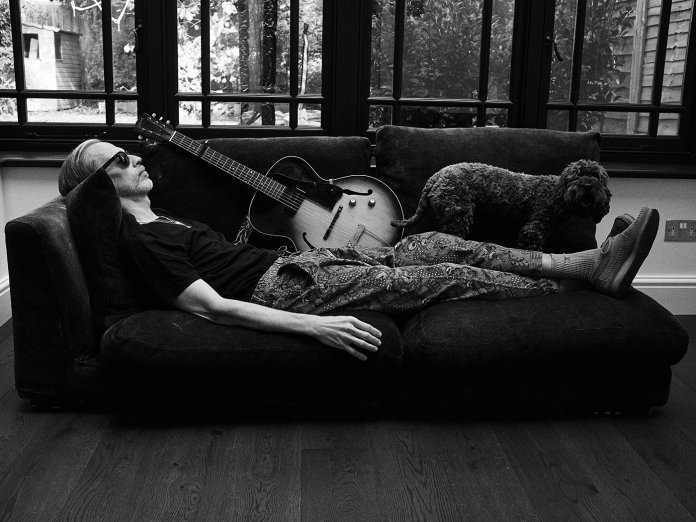The cover of Andy Bell’s second solo album features an obscured portrait of Bell shot for Ride’s 1990 debut, Nowhere. This old image of distorted youth reflects the themes of Flicker, a record that sees Bell explore ideas of nostalgia and memory while re-engaging with the optimism and playfulnes...
The cover of Andy Bell’s second solo album features an obscured portrait of Bell shot for Ride’s 1990 debut, Nowhere. This old image of distorted youth reflects the themes of Flicker, a record that sees Bell explore ideas of nostalgia and memory while re-engaging with the optimism and playfulness of youth from the perspective of a man of 50. The songs similarly cross time zones: some were written as far back as the 1990s and all were initially recorded in 2016 by Oasis’s Gem Archer before Bell completed them in lockdown in 2021, when it was hard to do anything but reflect.
Bell has been coaxed into his late-blossoming solo career by the Sonic Cathedral label. It started with a 7” (“Plastic Bag”/“The Commune”) in 2019 that Bell immediately recognised as the first step in his long-delayed journey into the spotlight. It’s taken a few decades for Bell to leave the security of a band, but he has now embraced the situation, releasing two albums in 18 months. The first, The View From Halfway Down, saw Bell test the waters before this more ambitious double album, which features 18 tunes bathed in reverb, coloured by synths and electronica, but essentially following a traditional singer-songwriter pattern.
Many double albums are endearingly scattershot, but Flicker has a consistency of sound and theme. The initial tracks were laid down by Bell in 2016 when the death of David Bowie persuaded him to finally record various songs and fragments that had never really been suitable for ongoing band projects. These recordings, all made at the same time with the same instruments, create a coherent backbone – a through line – that Bell embellished during lockdown with overdubs, horns and lyrics that all come from the same place and time. Following instrumental “The Sky Without You”, the album’s opening lines come from “It Gets Easier” – “I was halfway down/And I woke up late/
I took a typical turn/And found my dream state” – a nod to his previous album and belated arrival as a solo artist. From there, the album is rife with cross-references and crossword clues, from the yearning jangle of “Something Like Love”, which echoes Ride’s “Vapour Trail”, or the line from crystalline folk charmer “Lifeline” – “the other side of the looking glass” – which borrows the title of previous track, “The Looking Glass”, a song that is itself “Lifeline” played backwards.
Songs are rife with musical and lyrical allusions like the line about “the sound of confusion” on the paranoid Spacemen 3 drone of “No Getting Out Alive”, but while these are fun to track down, they aren’t just Bell being cute but reflect a broader theme of nostalgia and youth. “Memory is the only place I’m free”, he sings with his frighteningly youthful voice on the jangly “World Of Echo”, a song that references The Smiths. But Bell isn’t simply recreating the past; he is aware of the danger of pure nostalgia. While “Something About Love” recalls youthful days of “playing tunes to block out the bad dreams/Lost in the reverie of future days”, he warns “not to confuse your memories with something real”. The trippy, Hunky Dory-esque “This Is Our Year” looks forward tentatively to the future, albeit in the company of David Bowie – “David, are you watching our collective fever dream/Or did we shift dimensions back in 2016?” On “It Gets Easier” he is more defiant: “I’m living my best life/This is how it feels to feel”.
That track also claims “there’s no narrative that’s real” and the different strands of psychedelia find a place on Flicker. There’s speedy dark psych on “No Getting Out Alive” and the grandiose LSD-spider patterns of “Way Of The World”; the repeated use of phasing, reverb and backwards tracks; and songs like the instrumental “Gyre And Gimble”, “We All Fall Down” and “The Looking Glass”, which draw on Beatles/Floyd whimsy influenced by Lewis Carroll, Edward Lear and The Goons. This is another layer of nostalgia, an acknowledgement of both the music of Bell’s youth as well as the books and comedians of his father’s generation.
Yet Flicker is never derivative or predictable, with Bell using these influences to craft often beautiful songs, from the groove of “Riverside” to the lovely strum of the Simon And Garfunkel-influenced “Lifeline” or the springy disco-beat of “Sidewinder”. Bell says he can “overthink things”, but that’s nothing to be ashamed of when it produces such well-structured and thoughtful records. Flicker feels almost like a memoir, a monograph, and just as Bell welcomed listeners into his “dream state” on the opening track, he ends with a polite goodbye on “Holiday In The Sun”. “I’ll see you all again sometime/But for now my race is run”, he drawls, having downed tools and poured himself a margarita. It’s one, or more, well earned.



